(In)efficiency (Dean's List #4)
The eclipse is underrated, my new "albums," dictionary binging, essay mapping, architecture school, and alchemy.
Welcome to Dean’s List. I’m an architect turned writer. Substack is home for all my creative projects, and a place to think through the craft of essays. This is part of my monthly update series. You can also jump to my essays and daily logs.
Should you savor in the slowness or automate existence? That’s today’s theme. It’s tempting to pick one side, coin it as a jingle, and live by it. But in the last month, I’ve seen value in both ends: unreasonable tedium & unimaginable speed. Maybe we can embrace the paradox: how can we be the tortoise and the hair, the slug and the supercomputer?
33 hours for 3 minutes of totality_
I ended up catching totality (a full solar eclipse) in an ex-hippy-commune town in northern Vermont. My dad and I spent 18 hours driving, 3 hours researching in a motel, 5 hours not being able to sleep on a stiff, small, shared bed, 3.5 hours scouting different sites, and 3.5 hours waiting in blue fold-out chairs. All that for 3 minutes. Our “effort-to-experience ratio” was 660:1. This sounds pretty unreasonable, especially if you don’t grok the numinosity1 of totality. Annie Dillard said the difference between a 99% solar eclipse (through the goofy glasses) and totality is the difference between “kissing a man… [vs.] marrying him.”
Eclipse photos—whether from NASA or an iPhone—can’t capture the thrill of the chase, the extreme anticipation, the fffwwwooooppp moment of a sunset on 200x speed, the 3-minute mystical experience where you confront and overcome death, and the second after totality where beams of light pierce through the mountains of the moon (it’s so beautiful you don’t want to look away; this is how John Quincy Adams went partially blind).
This is one of those experience where prose beats pictures.
When I got home, I wrote on my typewriter to capture the emotional power of the experience. It’s been a while since I’ve done a first-person narrative essay like this, but I’m really happy with how it came out. Hope to do more like this soon. Usually my analog essays are for paid subscribers, but I made this one free.
For some more reading on totality, check out Tim Urban’s post, or Annie Dillard’s essay, Total Eclipse, from 1982 (which I haven’t read yet for anxiety of influence).
2 albums in 2 days_
In the last 10 years I’ve released 2 albums (one where I tried too hard and another where I didn’t try at all—a spoof of the Beatles at Shea Stadium where the screaming crowd is an instrument, and a time traveller brings a synth from future that shuts down the show).
After trying Udio last week, I published albums on Thursday and Friday.
Writers might enjoy the end of the 2nd album, which includes pedagogical hits like, “The Punctuation Family,” “Mr. Dictionary,” and “The Feedback Song.”
There are still huge limitations with AI songwriting. I can’t use my own voice, I can’t play instruments to write riffs, and I have no precise control over song direction. To shape a song in Udio, you: 1) set the mood with a prompt, 2) write lyrics with instructions in parenthesis, and 3) listen through the 30-second variants, make tweaks, and extend clips. Despite the limitations, both the audio quality & the musical intelligence are radically improved from 2020’s Jukebox (the tech behind the AI Beatles music I wrote about).
We’re not at the point of “one-click wonders” yet; it took time to make these. From these 23 tracks you hear, there are maybe 200 bad stems that didn’t make the cut. And while the instrumentation is effortless, I wrote 95% of the lyrics.
Still, the process of writing an album goes down from one year to one day. If I committed to this, I could release a concept album per day.
What’s amazing to me is how the lyrics bear so much influence on what the songs become. My main flaw in songwriting has been that I ignore lyrics until the very end of the process (I use non-sense placeholder lyrics while I shape melodies and song structures). Now, it’s entirely about the words. It is the single given, the center of gravity that harmony and rhythm bend around. Many of these songs include lyrics from songs I wrote in the past, and it shocked me how some of the melodies matched one’s I already wrote, and how some melodies are way better than the ones I came up with. It’s like the words have an invisible inner-logic on how they want to be made musical, and AI helps you quickly discover that.
AI music has a ton of wrenches and philosophical problems (this app was made in collaboration with Will-I-Am, and seeing The Black Eyed Peas perform at Ultra Music Festival in Miami in 2009 was a low point in my life), but I’m mostly excited. This is a tool for poets and writers to add a new dimension to their ideas.
Reading 7 dictionaries A>Z simultaneously
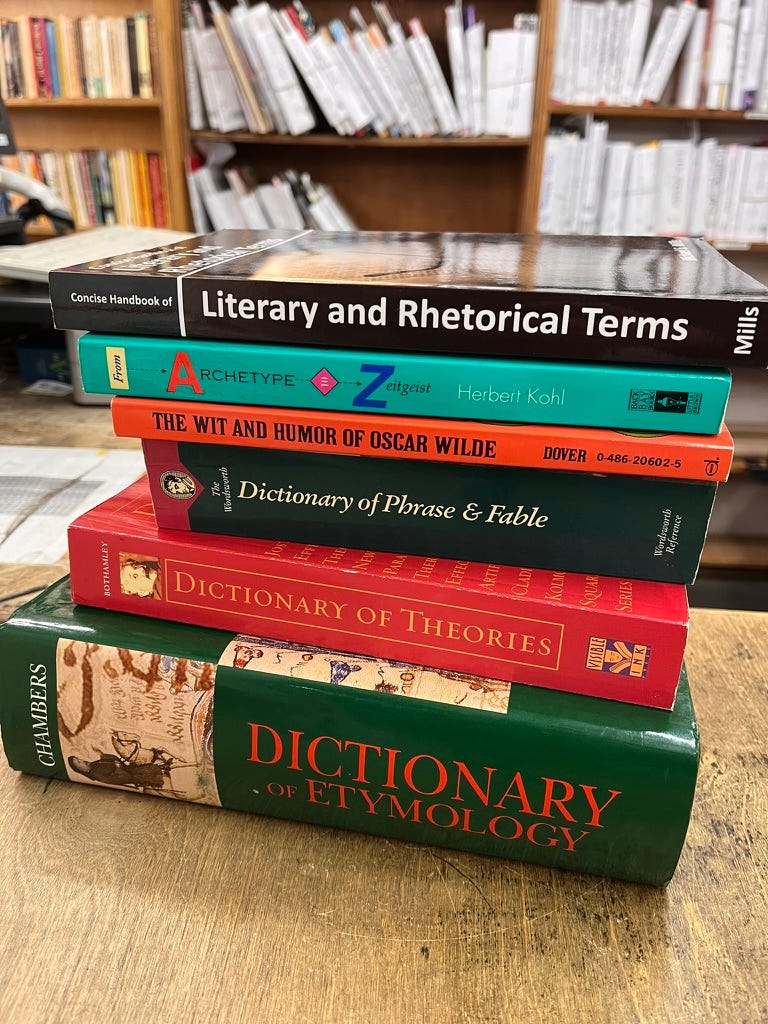
Reading reference manuals in full is some people’s idea of torture, but this is now my preferred form of procrastination. At least once a day, I’ll sit down and read a few pages to mark down the words that stand out; when I get bored, I’ll shift to the next book. I’m up to “Ad—” and hope to finish by EOY.
I never appreciated the weird niches of physical dictionaries that exist: dictionaries for myths, symbols, theories, literature, rhetoric, origins, etc. I found something like “a dictionary of time” (a record of all events that ever happened) but it was too big to carry. While there’s something clean and efficient with a searchable database, an obscure physical dictionary is like a landscape with hidden gems; I leave each session with something like 50 new words. I come across concepts I’d never find in my normal reading routes.
It’s not just about reading these dictionaries, but sifting through noise, finding hits, researching them, and then redefining them in my own way. I’m slowly building a collection on my site (link below).
I also got Roget’s Thesaurus—in dictionary (A>Z) form—and was pretty disappointed. The word “belief” has a 187-word word-cloud; are we to assume these are all swappable synonyms? Each word should have a unique usage. I’ve been doing some thinking on a better architecture for the thesaurus; the scope is unfortunately ridiculous (the entire English language lol), but maybe I’ll work on that after Essay Architecture.
Essay Architecture_
Sometimes I’ll isolate essay patterns, but sometimes I’ll deconstruct a full essay. In case you missed showing vs. telling, here’s a video breakdown of David Foster Wallace’s, “How Tracey Austin Broke My Heart.”
The next post in the EA series is about a response. It’s one of the patterns in how to craft a thesis. Where the microcosm pattern is about scoping down your frame to reveal a larger truth, the response is about getting out of a vacuum. Even the most original ideas exist in context of things already said in the culture. The book They Say, I Say, is about framing your thesis as a response to an existing idea.
Here’s a WIP diagram on the different ways to do it:
For $8/month, you’ll get an essay for all 27 patterns of Essay Architecture.
Go touch paper_
Still chugging through my essay on the Apple Vision Pro, but wanted to share a picture from 10 years ago that shows my “spatial operating system” in architecture school.
06: Alchemy for writing and being
Check out my post on assay vs. essay. The word “essay” comes from Michel Montaigne, but it’s cousin-word, “assay” was used by the alchemists 100 years before. These words represent two opposite halves of a process. When you constantly shift back and forth between them, you turn ordinary insights into linguistic gold.
I’ve been getting into the alchemists; it seems like their whole philosophical worldview is about the fusion of opposites, which is a pattern I’m seeing more and more in my own life (ie: this post about efficiency vs. inefficiency).
I’ll have to do a deeper dive on the alchemists one day, but wanted to share these two quotes for now:
From Brene Brown (quoting Jung, quoting the alchemists):
“Carl Jung wrote, 'Only the paradox comes anywhere near to comprehending the fullness of life.' We are complex beings who wake up every day and fight against being labeled and diminished with stereotypes and characterizations that don't reflect our fullness. Yet when we don't risk standing on our own and speaking out, when the options laid before us force us into the very categories we resist, we perpetuate our own disconnections and loneliness. When we are willing to risk venturing into the wilderness, and even becoming our own wilderness, we feel the deepest connection to our true self and to what matters the most.”
From Hermes Trismegistus (the OG alchemist):
"If then you do not make yourself equal to God, you cannot apprehend God; for like is known by like. Leap clear of all that is corporeal, and make yourself grown to a like expanse with that greatness which is beyond all measure; rise above all time and become eternal; then you will apprehend God. Think that for you too nothing is impossible; deem that you too are immortal, and that you are able to grasp all things in your thought, to know every craft and science; find your home in the haunts of every living creature; make yourself higher than all heights and lower than all depths; bring together in yourself all opposites of quality, heat and cold, dryness and fluidity; think that you are everywhere at once, on land, at sea, in heaven; think that you are not yet begotten, that you are in the womb, that you are young, that you are old, that you have died, that you are in the world beyond the grave; grasp in your thought all of this at once, all times and places, all substances and qualities and magnitudes together; then you can apprehend God."
Let’s riff:
The eclipse, the hype …
AI music…
Words, language, essays…
Alchemy…
Convenience vs. inconvenience…
numinosity : a sense of the supernatural and mysterious. Check out Rudolf Otto’s writings on the numinous, specifically his idea of the Mysterium Tremendum.

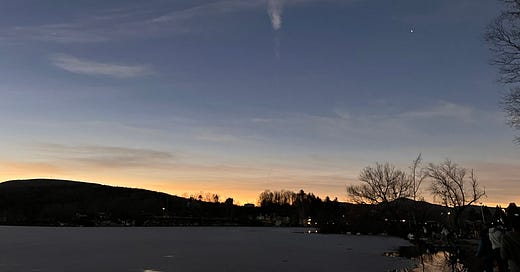



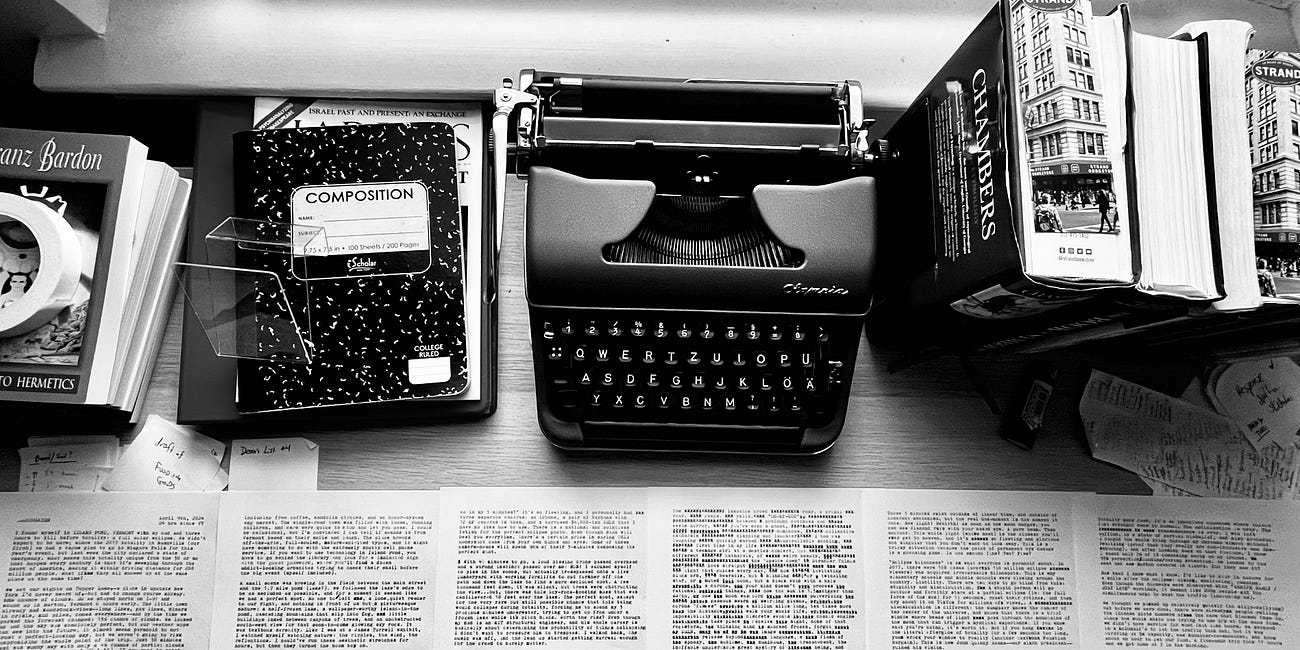
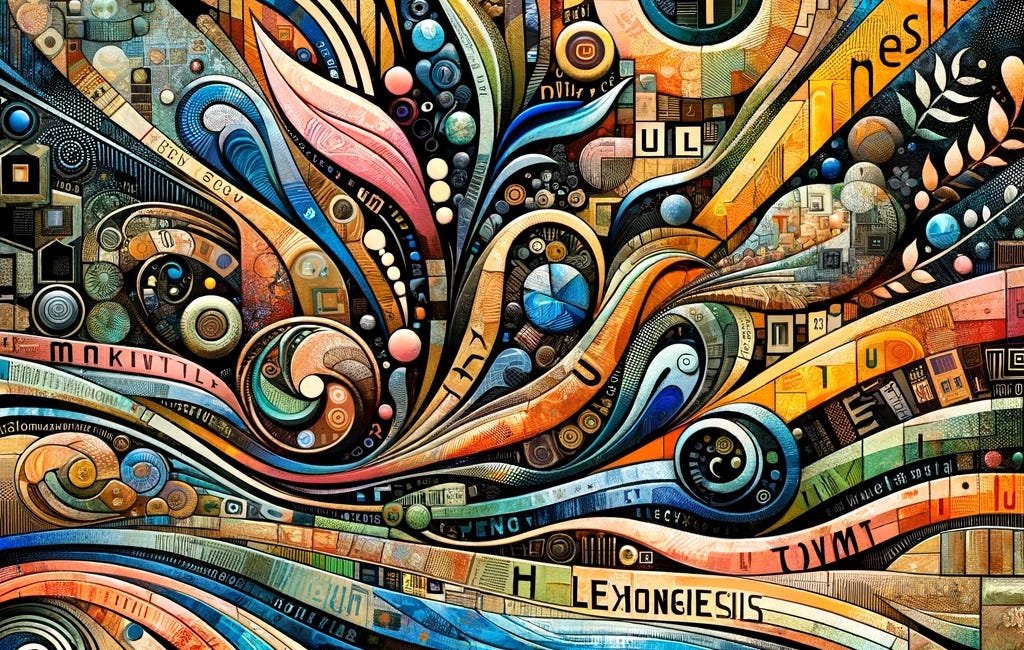
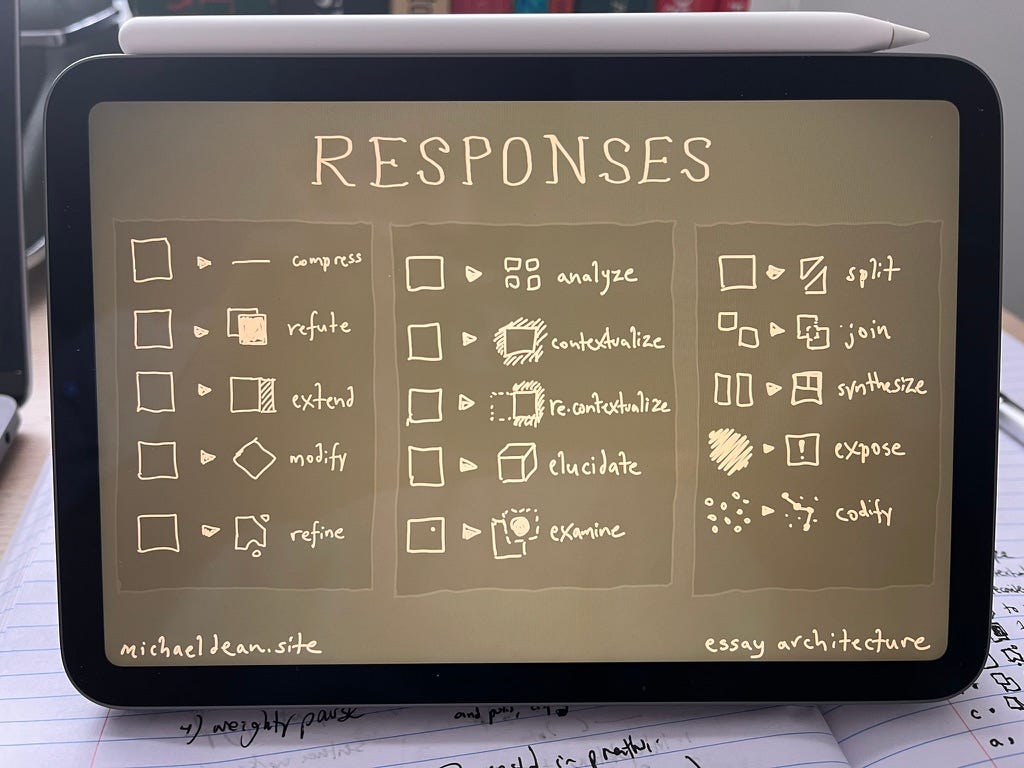

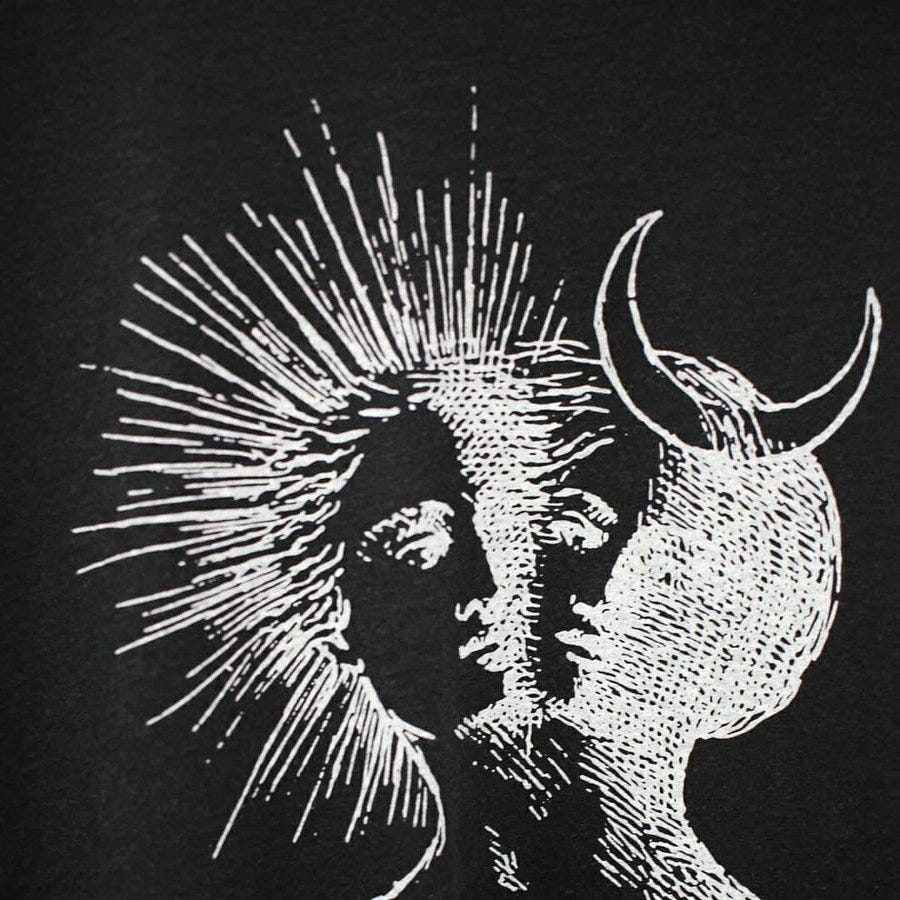
...100% here for that "spatial computing" photo...your mind makes 20% more sense to me now...
---
<--RIFFS-->
() eclipse --> (https://cansafis.substack.com/p/days-watching-night-sky)
() a.i. music --> Why are A.I. engineers focused on solving creativity, instead of creatively solving problems -- we were at peak music with the number of Humans able to produce and self distribute (for no money) on the internet -- so much music it would be impossible to listen to it in a million lifetimes -- and now we can just have a computer do that how ever many times a day -- reminded me of this article (https://www.nytimes.com/2024/03/31/magazine/spotify-matt-farley.html) --> I don't foresee "better" music bc of this just "moar" -- we continue to be gluttons
() words/language/essays --> my version of this growing up were the psychotronic film guides, and similar bad/good movie catalogs (Roger Ebert, Leonard Maltin, etc.). I'd daily just open to 2-4 pages of reviews and descriptions and read every review/description. Probably should have done the encyclopedia instead.
() alchemy --> should be taught in school
() Convenience vs. Inconvenience --> https://www.youtube.com/watch?v=2mMW3UA7g_0
Fascinating!